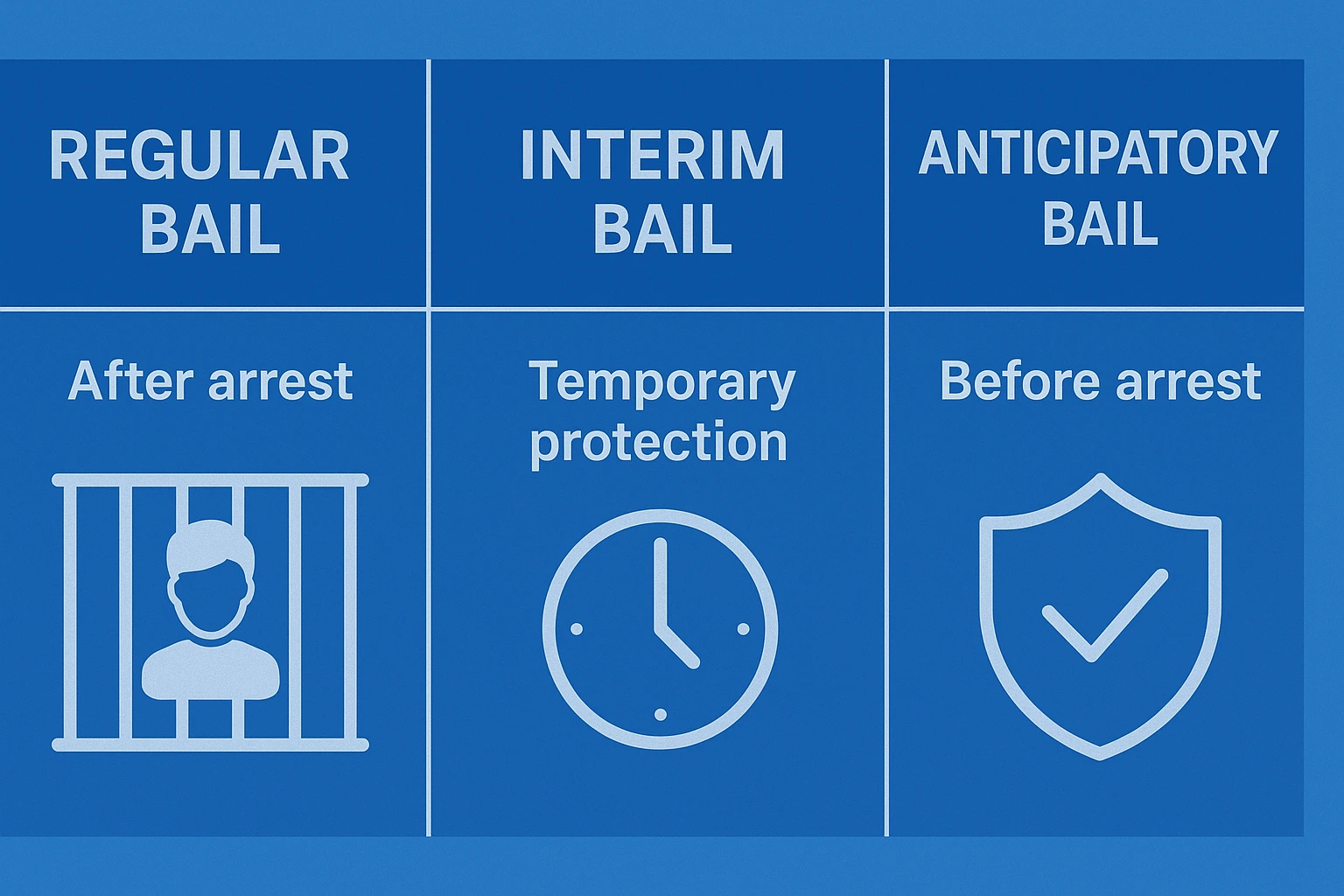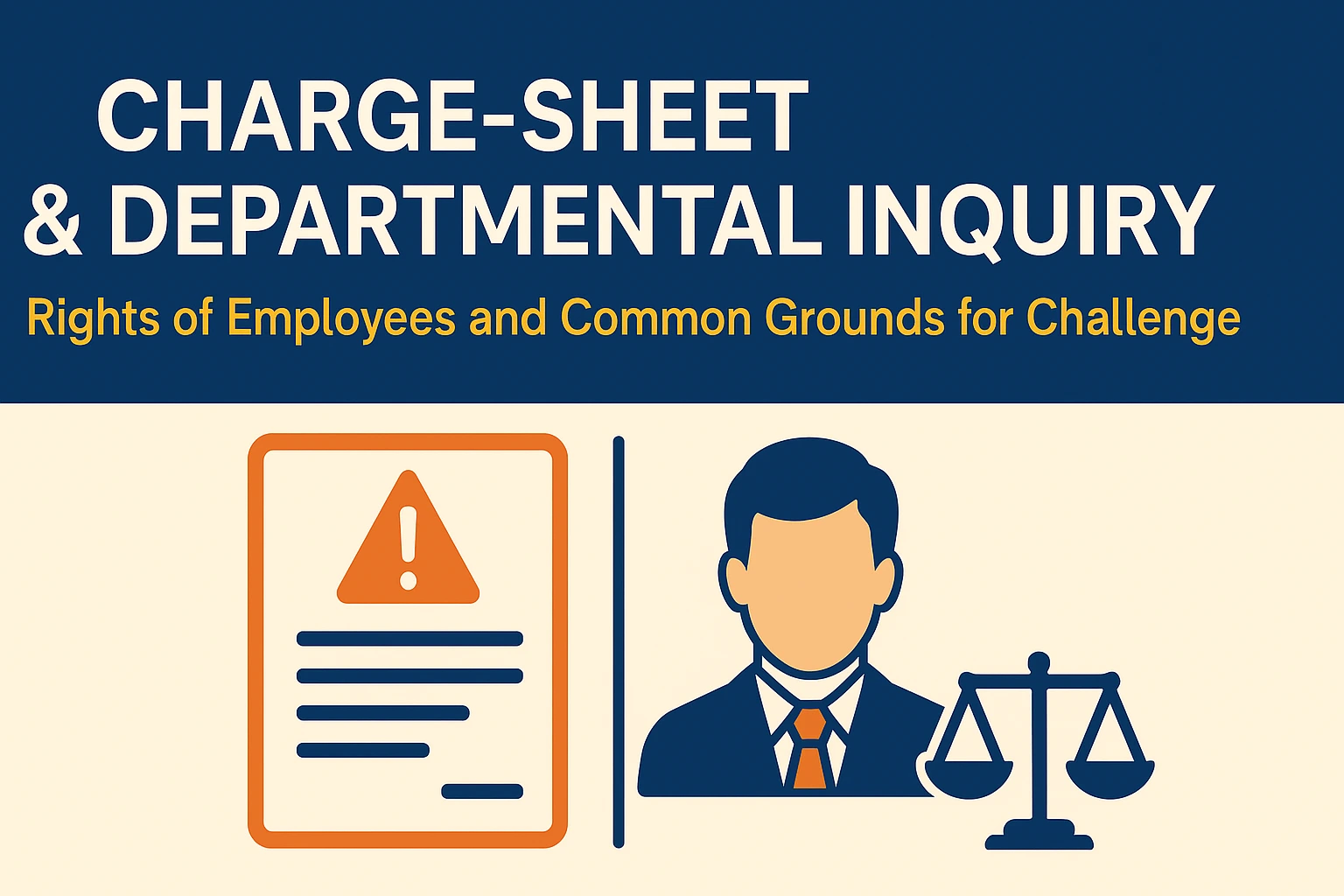
Difference Between Regular Bail, Interim Bail & Anticipatory Bail – Complete Guide
Introduction
In criminal law, the concept of bail is essential for safeguarding personal liberty. When a person is accused of an offence, bail ensures they remain free during investigation or trial — provided they follow conditions imposed by the court. However, not all bail is the same.
People often get confused between Regular Bail, Interim Bail, and Anticipatory Bail. Each serves a different purpose, applies at a different stage, and follows different legal principles.
This guide explains all three types in simple terms, with examples, procedures, legal provisions, and key differences to help readers clearly understand the Indian bail system.
1. What Is Bail? (Simple Explanation)
Bail is the temporary release of an accused person from custody, subject to certain conditions.
Bail does not mean the accused is acquitted — it only ensures their participation in the investigation and trial while protecting their liberty.
2. Types of Bail in India
Indian law recognizes three major types of bail:
- Regular Bail
- Interim Bail
- Anticipatory Bail
Each serves a different purpose. Let’s understand them one by one.
3. What Is Regular Bail?
Legal Provision:
- Section 437 CrPC (When case is before Magistrate)
- Section 439 CrPC (When case is before Sessions Court or High Court)
When It Is Used:
Regular bail is sought after a person has already been arrested and is in police or judicial custody.
Example:
A person arrested for a non-bailable offence is produced before a Magistrate. After spending time in custody, they apply for regular bail.
Purpose of Regular Bail:
- To secure release from custody
- To ensure the accused attends the trial
- To allow the accused to prepare defence
How to Apply:
- Arrest occurs
- Accused is produced before Magistrate within 24 hours
- Bail application filed before Magistrate/Sessions Court
- Court evaluates grounds and passes order
When Courts Grant Regular Bail:
- No need for further custodial interrogation
- Accused is not a flight risk
- Evidence is mostly documentary
- Offence is not extremely grave
- No chance of tampering with witnesses
4. What Is Interim Bail?
Legal Nature:
Interim bail is a temporary, time-bound bail granted by the court until a final decision is made on a regular or anticipatory bail application.
When It Is Used:
- When immediate protection is needed
- When the court needs more time before deciding bail
- When the State wants to file a status report
- When the court wants to hear detailed arguments later
Duration:
- Short period (few days to weeks)
- Ends automatically when:
- Regular / anticipatory bail is decided, or
- The court’s time period expires
Example:
An accused applies for anticipatory bail. The hearing is scheduled after 7 days.
Until then, the court grants interim bail to protect against arrest.
Why Courts Grant Interim Bail:
- Urgent protection needed
- FIR appears weak
- Medical grounds
- Police eagerness to arrest
- Courts need time to verify facts
5. What Is Anticipatory Bail?
Legal Provision:
- Section 438 CrPC
When It Is Used:
Anticipatory bail is sought before arrest, when a person fears they may be arrested for a non-bailable offence.
Purpose of Anticipatory Bail:
- Protect from arrest
- Prevent police from taking accused into custody
- Ensure cooperation with investigation
- Prevent harassment in false or motivated cases
How It Works:
- Person applies to Sessions Court or High Court
- Court may grant:
- Interim protection, or
- Full anticipatory bail
- If police attempt arrest, the person must be released on bail immediately
Examples Where Anticipatory Bail Is Commonly Used:
- Matrimonial disputes
- Business disputes
- Property disputes
- Political rivalry cases
- False allegations
When Courts Grant Anticipatory Bail:
- FIR lacks prima facie evidence
- Case appears malicious
- No need for custodial interrogation
- Accused has roots in society
- Accused cooperating with investigation
6. Key Differences Between Regular Bail, Interim Bail & Anticipatory Bail
Below is a clear comparison table for better understanding:
| Feature | Regular Bail | Interim Bail | Anticipatory Bail |
|---|---|---|---|
| Stage of application | After arrest | Before final bail is decided | Before arrest |
| Legal Provision | 437 & 439 CrPC | Judicial discretion | 438 CrPC |
| Purpose | Release from custody | Temporary protection | Protection from arrest |
| Who can apply? | Arrested person | Any bail applicant | Person fearing arrest |
| Duration | Till trial ends | Short-term & temporary | Until conditions modified or case ends |
| Arrest required? | YES | Not required | NO |
| Custodial interrogation? | Considered | Not applicable | Courts deny if interrogation needed |
| Common Use | Post-arrest release | Temporary relief | Prevent misuse of arrest powers |
7. Examples for Easy Understanding
Example 1: Regular vs Anticipatory Bail
- Police register FIR for cheating.
- Accused fears arrest → applies for anticipatory bail.
- If arrested and in jail → they apply for regular bail.
Example 2: Interim Bail
- Court needs a police reply before deciding anticipatory bail.
- To protect the accused meanwhile → court grants interim bail.
8. Important Supreme Court Judgments
1. Gurbaksh Singh Sibbia (1980)
The Constitution Bench held that anticipatory bail is fundamental to personal liberty and cannot be granted mechanically.
2. Siddharam Satlingappa Mhetre (2011)
Court emphasised that arrest should be the last option; anticipatory bail can be broad and long-lasting.
3. Arnesh Kumar v. State of Bihar (2014)
Guidelines to prevent unnecessary arrests in 498A and similar offences.
4. Latest SC Position (2025)
Supreme Court clarified bail should not be based solely on undertakings or deposits — must be decided on legal merits.
9. Which Bail Should You Apply For?
| Situation | Correct Type of Bail |
|---|---|
| You fear arrest soon | Anticipatory Bail |
| You were arrested & want release | Regular Bail |
| You need immediate protection until final hearing | Interim Bail |
10. Final Summary
Understanding the differences between Regular Bail, Interim Bail, and Anticipatory Bail is crucial for anyone facing criminal accusations or fearing arrest.
- Regular bail is for release after arrest.
- Interim bail is temporary protection until the court decides.
- Anticipatory bail is protection before arrest happens.
Each type has its own procedure, purpose, and legal tests. Choosing the correct one — and applying strategically — can make a significant difference in ensuring personal liberty and preventing misuse of criminal law.



Comments (0)